Resident Education
Morning rounds and teaching conferences provide for a formal group learning environment. Each week is structured to exercise knowledge in the Orthopaedic subspecialties through Attending-facilitated teaching conferences. These high-yield sessions use primary literature, multimedia resources, and anatomic models to prepare for standardized exams as well as Orthopaedic practice.
The following outlines a typical week for Stony Brook Orthopaedic Surgery residents:
Daily Conferences
X-ray Rounds: Every Monday-Friday morning. Led by the Chief residents, clinical history and imaging of all the Orthopaedic consults from the previous day/night in the Hospital and Emergency Room are reviewed. Rounds are followed by a Sub-Specialty conference and/or other educational activity as outlined below:
Mondays
Pediatrics Conference: An assigned topic and article(s) are presented and discussed, led by Drs. Carrion, Wallach, and Barsi. Afterwards, post-operative cases and outcomes from the prior week are discussed, and preoperative cases for the coming week are reviewed with active teaching throughout.
Tuesdays
Spine Conference: Similar to Pediatrics conference, classic and current primary spine literature and a particular topic are presented, reviewed, and discussed with Drs. Stephen and Morelli. Following in suit, post-operative and pre-operative cases are used for further teaching modalities and discussion.
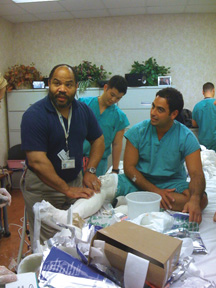
Wednesdays
An extended didactic learning day with three hours dedicated to our Orthopaedic Surgery education in the form of various conferences, planned cadaver or skills labs, and specialty seminars.
Sports Conference: Weekly article presentation and topic review with Drs. Penna and Paci regarding current and past Sports Medicine literature.
Hand/Foot & Ankle Conference: Weekly high-yield article and/or relevant publication presented by a Hand Attending or Hand Fellow, similarly presented topics for F&A with Dr. Paulus.
Grand Rounds: Held 2-3 times a month with in-depth, topic-based lectures provided by Visiting Professors, Attendings, or Senior/Chief Residents in one of our media integrated lecture halls.
Tumor Board: Monthly multidisciplinary (Orthopaedics, Medical Oncology, Radiology, Radiation Oncology, Pathology) meeting led by Dr. Khan to collaboratively present and discuss recent surgical cases of bone and soft tissue cancers.
M&M Conference: Quarterly departmental meeting where resident case presentations of morbidities and mortalities are discussed by residents and faculty.
Simulation Lab Exercises: Held monthly under the leadership of the Chief Residents in the presence of sponsors to provide residents experience with various surgical tools, highlighting different equipment including those for surgical approaches, arthroscopy, and fixation devices.
Fresh Frozen Cadaver Lab: Weekly cadaver dissections begin after the OITE each year. With both departmental and industry funding, residents perform surgical approaches of the upper extremity, pelvis/acetabulum, and lower extremity. Cadavers are also instrumented with trial implants from various trauma systems, adult reconstruction systems, and arthroscopy systems. Outside speakers will periodically attend the cadaver labs to offer additional insight for residents during these exercises.
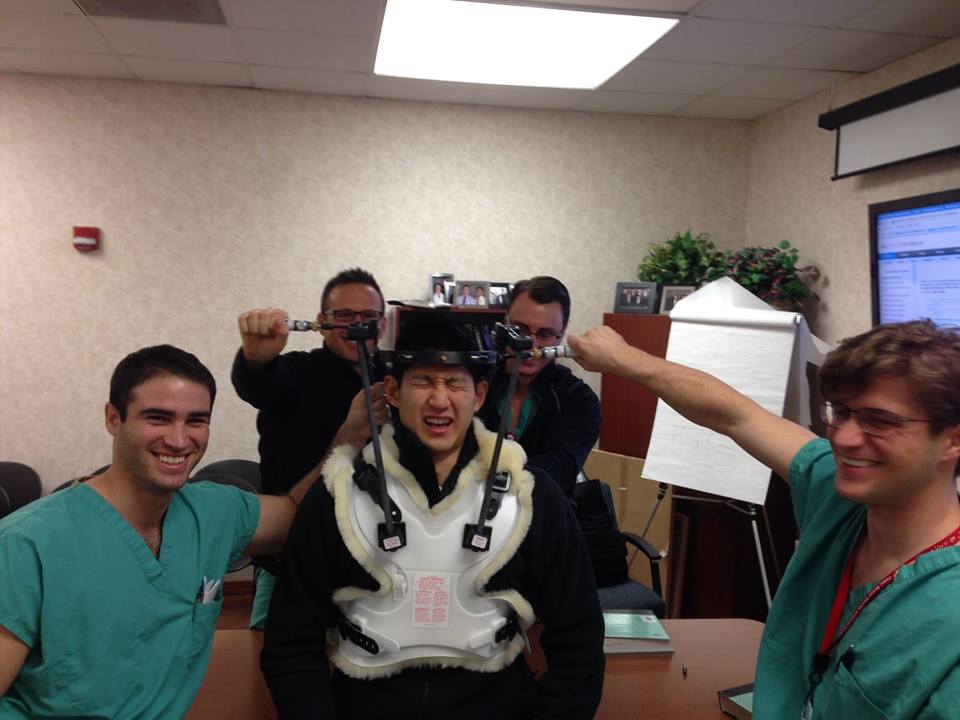
Thursdays
Trauma Conference: Injury-based case presentations by junior residents of recent post-operative Orthopaedic Trauma patients with review and analysis of each case, discussions led by Dr. Kottmeier and Dr. Divaris.
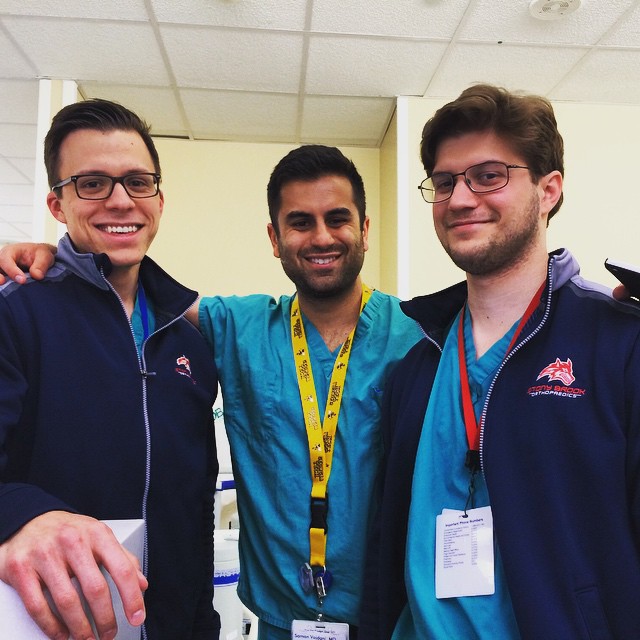
Fridays
Joint Reconstruction Conference: Bimonthly conference covering wide range of topics in the field, as taught by Dr. Nicholson.
Orthopaedic Oncology Conference: Bimonthly conference addressing many high-yield topics in Orthopaedic Oncology, as led by Dr. Khan.
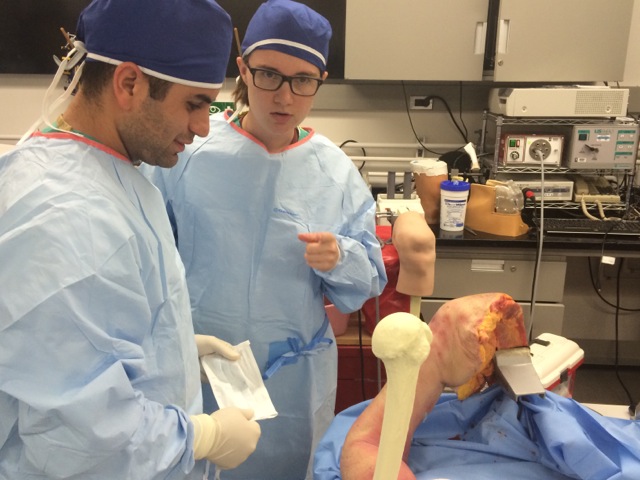
Academic Courses
All residents are granted time off to attend one academic course per year. In addition, any resident with an abstract accepted to a society meeting is granted full departmental support to present his research.
Required courses include:
PGY-2: residents attend the AO Basics course of their choosing, funding provided by the Orthopaedic Surgery Department with industry support from Synthes
PGY-4: residents attend the annual AAOS national academy meeting, funding provided by the Orthopaedic Surgery Department
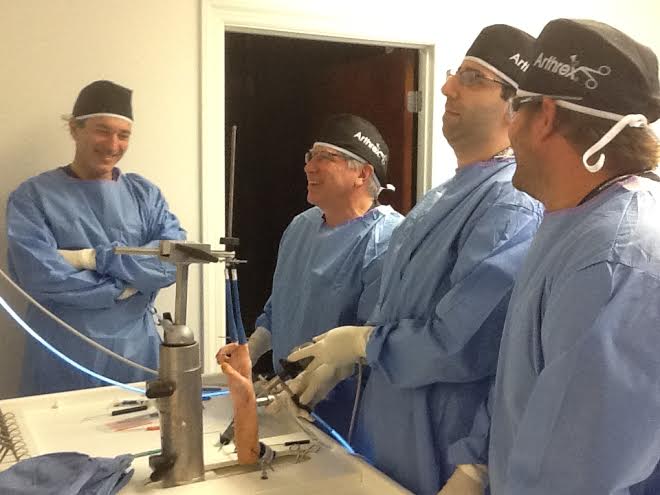
Journal Club
Each senior resident is assigned a month to select 3-4 articles for Journal Club. The resident assigned for that month typically chooses an article from one of the “Big 7” orthopaedic journals. These are usually held at a local restaurant, bar, or an attending’s house, and are centered on current articles from a specific subspecialty of orthopedics. Multiple attendings from any or all of our 4 rotating hospitals are usually in attendance at these Journal Clubs.
Resources for Our Residents
Health Sciences Center: State-of-the-art research building attached to Stony Brook Medicine and home of The Department of Orthopaedic Surgery (18th floor). The building contains several media integrated lecture halls, computer labs, and the Clinical Skills/Surgical Skills Center, an advanced OSCE and skill training facility used for Orthopaedic resident education.
Health Sciences Library: access to 24 hour (on or off site) online access. The musculoskeletal e-journal offerings are quite extensive, and the Help Desk offers outstanding services with regards to acquisition of items outside the catalog. Additionally, our residents and faculty have free access to an extensive catalog of academic software, from antivirus titles to statistics and MS Office.
Orthopaedic Resident conference room: fully media capable with multiple large LED screens and is hard wired to the musculoskeletal lab. All lab activity can be recorded and viewed live via direct communication with the resident conference room. This is where many of our specialty conferences are held.
Orthopaedic Resident library: A comfortable study space attached to the conference room and contains a large archive of textbooks, journals, and learning resources. The library also has several computer terminals, printers, and a full service copier/collator/scanner.
Microsurgical Skills Lab: fully functional microscopes, both standard and trainer/dual scopes, instruments and suture materials.
Wet-Dry Surgical Skills Lab: fully functional surgical demo and modeling area used for research, anatomic dissections, and surgical/arthroscopic practice.

